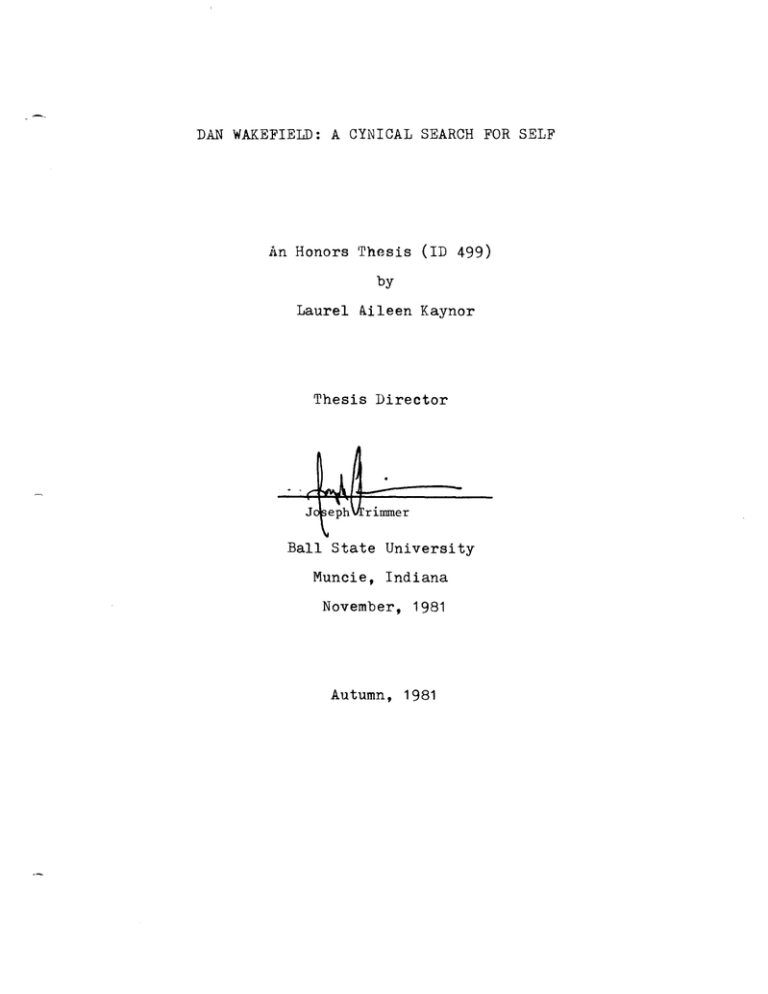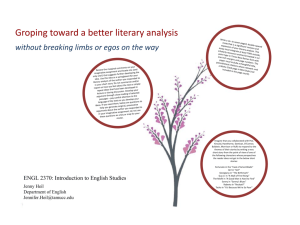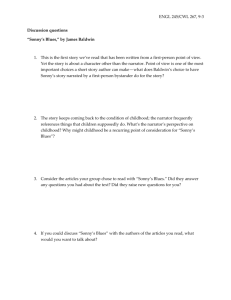DAN WAKEFIELD: A CYNICAL SEARCH ... An Honors Thesis (ID 499) by Laurel
advertisement

DAN WAKEFIELD: A CYNICAL SEARCH FOR SELF An Honors Thesis (ID 499) by Laurel ~ileen Kaynor Thesis Director rinnner Ball State University Muncie, Indiana November, 1981 Autumn, 1981 Dan Wakefield possesses a growing cynicism with regards to Man's search for an ideal in life. parent in his writing. This is extremely ap- In his first novel, Wakefield is quite optimistic about this ideal. He feels that it is feasible; if one searches enough he will find his personal ideal, that which will solve all problems and make life complete. In his second novel, however, he questions the possibility of reaching such an ideal, and in his third novel he expresses the belief that the search for an ideal is futile. "The SE!arch lf is an integral part of Western Culture. It is something that everyone must go through at some point in his life. As conceptualized by this ·culture, it consists of a per- sonal journey which manifests itself both internally and externally; it is a journey of the spirit as well as the body. The quest is for something intangible; the searcher knows that he is sear.ch"ing for the Ilsomething" that will make his life ideal, but he does not know what it is. He fervently believes, however, that he will know it for what it is when he finds it. In the course of h.is pursuit for this ideal he encounters many obstacles. The searcher often uses many substitutions for that which he feels is missing; they are temporary solutions to the problems he encounters while searching. When he reaches his ideal, how- ever, all of his problems will be solved, and ~he searcher, in- spired by his accomplishments, may then repeat the journey as he seeks new ideals, or he may cease journeying altogether because he is thorOughlyfo0ntent with the ideal he has reached. Wakefield believes in this abstract of "The Search." Thus, Kaynor 2 he embodies his characters with this searching quality. The characters are all searching for the "something" that will make their lives complete. During the course of their journeys they encounter many obstacles, and they rely heavily upon substitutions to fill in the voids these obstacles create. Nevertheless, they search relentlessly, their hope of the ideal buoying them, giving them the strength to go on. Thus, Wakefield sends each of his characters on a journey towards self-discovery. Wakefield believes that this search is timeless, that it remains the same decade to decade, generation to generation. Thus, he place3 each of his characters in a different decade during various American movements, yet sends all same quest. 01' them on the His major characters, all men, are lost emotionally and confused as to what they want to do with their lives. They all ultimately stumble onto something-which will carry them to the next phase of the search, or, in other words, reach a temporarysubstitution or solution to their problems. His minor char- acters are searching as well, and their searches serve as contrasts to those of the major characters. Wakefield pairs a major and minor character together as "buddies" who set off on their personal searches together and who ultimately reach very different solutions. This difference becomes increasingly noticable in each of his three novels successfvely. As Wakefield's writing matures, his hopes of finding the ideal diminish and he becomes progressively more cynical regarding the ultimate solution to the great "Search." Wakefield's opinions concerning ,!The Search" have been greatly influenced by J. D. Salinger's novel The Catcher in the Kaynor 3 Rye. Holden Caulfield, the major character in the navel, is on a search for self. He does not know who he is or what he wants to do with his life. His journey leads him to several schools where he encounters many obstacles, yet he continues on. Ul- timately, he ends up in an institution undergoing psyc~nalysis. His substitutions have not been enough to keep him going. He does not really find a solution; rather, he discovers more about himself and thus prepares himself for the next phase of his search. Wakefield's major characters directly relate to Holden Caulfield, and they share many of his feelings of alienation, confusion, and doubt. Soap opera has also affected Wakefield's beliefs. He feels that so,ap operas give a "more accurate feel" of American society than do newspapers and magazines. Furthermore, he feels that though unbelievable at times". soap operas are not nearly as incredible as is real life. The characters tn soap operas are on a constant search for something better than they already have. They live from crisis to crisis, meeting many obstacles which: block their paths to the ideal. Wakefield refers to this as the "short peace between the clamor9 of.lifj." These clamors are the obstacles which inhibit his characters' searches for self. Wkaefield's first novel, Going All The Way, was written in 1970. It concerns the search of_the major character, Sonny (Wil- lard) Burns, and that of the minor character, his friend Gunner (Tom) Casselman. Though Sonny is "unsensational" and Gunner "glo.rious," they set out on identical searches for discovery of self. Their searches separate quickly, but the two become fast friends. Kaynor 4 Sonny is an outsider. He has never done anything spec- tacular or incredibly worthwhile in his life. In the beginning of the novel, he is returning horne from the service after the Korean War. Even his war career has been drab; h'~ in Public Information for the Army in Kansas City. merely served He is 23 years old and has no future plans whatsoever. Sonny bears a great resemblance to Salinger's character Holden Caulfield. sense. Both are outsiders, social outcasts in a Neither of them fit in with "the popular group." neither of them is particularly outstanding in school. Also, Each sees himself as being on the edge of society looking in. This negative self-perception provokes each of them to undertake a journey, and thus Sonny and Holden, each in his own way, embark on a journey of self discovery which they hope will lead them to the inside. Sonny's search is complicated. He is searching for some- thing, but he really is not sure of exactly what it is. He believes, however, that he will know whe~e finds it, and he expects it to corne to him, as if by magic. He ;quickly realizes that he must seek it instead if he is to be successful. He knows that he should get a job or go back to school for further training, but he merely thinks about rather than acts upon it. He just wants to be happy and adjusted. The manner in which Sonny approaches his search is less than admirable; in fact, it is rather pathetic. Sonny knows that he is searching, but he does not gear his search in any specific direction or towards anyone goal, and he does not actively pursue it. Rather, he sits at home and apparently Kaynor 5 waits for everything to come to him, though he knows better than to do this. He lacks energy and enthusiasm, and thus grows quite disgusted with himself. He feels "good for nothing" and "loggy" sitting around on his "dead ass," yet even this guilt does not motivate him. He sees time slipping by and realizes that he is rapidly getting nowhere. Sonny finally seeks motivation through music. He listens to Richard Rodgers' Victory At Sea because it makes him "feel like a different person." He progresses in his journey, de- termining exactly what he will search for by making a list entitled "Things To Do." Throqgh this action he realizes that he is searching for a career in photography, and he decides to actively pursue this interest by talking to a professional photographer. Ultimately, this sets him on the right path and brings him closer to a solution. An important aspect of Sonny·s search is his friendship with Gunner. It is a form of support system for him and helps him in his journeying. Sonny lives vicariously through Gunner's adventures and thus gains the strength to continue his own search. Knowing that 6unner is searching as well encourages Sonny because he is already in awe of Gunner's past accomplishments. friendship and joint search help him to reali~e This that everyone is searching for something in life and that he is not alone in his journeying. This knowledge of the universality of "The Search" makes Sonny more acutely aware of his own lethargy and helps to motivate him. During his search, Sonny encounters many obstacles. His greatest ostacle lies within himself in the form of his apathy Kaynor 6 and indifference to his life and his search. tivated this blocks him at every turn. Until he is mo- This lack of incentive causes Sonny to stagnate rather than to progress and mature, and thus severely hinders his search initially. Sonny's feeling of alienation is also a serious obstacle. He lacks confidence in himself and feels that he is an outsider in all situations. This prevents him from becoming active in any new situation which occur... It also keeps him from step- ping out of his rut and looking for a career. Although he is an exceptionally good photographer, he laeks faith in his own ability to do anything and thus believes that anyone he encounters will feel the same way. As long as he thinks of him- self as an incapable outsider, he will be one. This negative attitude severely retards his progress in his search. He often fails for the simple reason that he is convinced of his ineptitude. Outside obstacles affect Sonny as well; these come in the form of his parents. Though they think that they are helping Sonny, they seriously impede his search. They encourage his laziness and contribute to his lack of amb;tion by telling him that it is understandable that he does not feel like doing anything, that sooner or later something will come along which he will feel like doing. This gives Sonny an emotional crutch and keeps him from actively pushing towards his ideal. Sonny's mother is a religious fanatic, and she constantly forces her Christianity upon him. She thinks that she is doing him a favor by trying to save his soul, but in reality she is causing him to draw farther into his shell and rebel. He is infuriated by her actions, and in attempting to Kaynor 7 get revenge upon her he retreats in his search. not only hurts her, he hurts himself as well. act keeps him from his search. In so doing he Each rebellious He adds to his problems rather than seeking a solution for them. Sonny's relationshmp with his father creates an emotional obstruction in his journey. He gets along with his father, but there is no great love lost between them. Sonny wants to be able to turn to his father but cannot because he feels awkward l)bout it. Similarly, Mr. Burns wants to encou"C'age Sonny and be supportive of him, but he does not know how to go about it. He helps Sonny to build a rut and then watches him crawl into it, without offering advice of any kind. In helping his son to stay sheltered from the world, Mr. Burns hinders Sonny's emotional growth and keeps him from journeying further towards self-discovery. Sonny uses many substitutions to fill in for the ideal he can never seem to reach. These substitutions are important to him because he tries to fool him.elf into believing that they are some type of a solution when, in reality, they are actually more of a barrier. solutions. Sonny seeks cons'olation' from these surrogate They give him a false sense of security, making him feel as though he has found at least some amall portion of the of the answer, the ideal. Ultimately, he finds that they are empty, void. of any real value in helping him to discover himself. Sonny turns to sex for solace. He is obsessed with it, and. will take it in any form that he can get it. He masturbates frequently to relieve tension and give himself pleasure. While in the process, he fantasizes about being with sexually dynamic women, imagining himself to be "a great cocksman" as he puts it. Kaynor 8 This results from his freqeunt inability to have effective sexual rtlations with women. He also fantasizes in this fashion every time he sees a beautiful or sexually attractive female. as he is through, however, he feels hollow and lonely. As soon He'is disgusted with himself and realizes how futile and isolated masturbating and fantasizing are. Sonny realizes as well that these things will get him nowhere, but he cannot stop because they are among the few physical/emotional feelings he is capable of having. Food is another important substitution for Sonny. He settles for drowning his sorrows in ice cream, soda, pies, and pastries ra.ther than finding a solution t:o them. temporary comfort and long-term flab. They offer Sonny is disgusted with this habit of his because he know that it stands in the way of his goals, but he does nothing to break it. It is easier for him to stay in this secure rut than to push on in his search. Sonny often substitutes the effects of.~iquor for reality. When he drinks he is t~orarily able to forget about the miserable progress he is making in his search and the realization that he is not finding his ideal. almnst daily. He and Gunner drink heavily When they talk about their ambitions while swil- ling Budwei.ser Sonny can mak~ himself believe that his life will be well-ordered and happy in a short time. Drinking makes him feel that his search is nearly over when in reality it is only beginning. In an obscure way, however, it gives him the strength to carryon, though it does create some setbacks. Conversley, Gunner's search is not filled with substitutions. Gunner will settle for nothing less than exactly what Kaynor 9 he wants, and he applies this positive philosophy to his search. Unlike Sonny, Gunner takes a direct, straightforward approach to his search. Though he does encounter some obstacles, they do not impede his search in the least. Gunner gets what he wants by finding a solution to or a way around everything which can possibly hamper him. He is sure of himself and knows that he will find what he wants if he applies himself diligently to his search. Gunner is 23 years old, and he has also just returned from the service. Unlike Sonny, however, Gunner has been a hero in everything he has ever done. He was a star football player in both high school andd college, and socialized in the most popular circles. Sent overseas during the war, he was wounded and returns home highly decorated for his valor. He is, and always will be, important, popular, and successful. Like Sonny, Gunner is on a search for self-discovery. is looking for the ideal. special ~so.mething" He that will make his life Unlike Sonny, however, Gunner has a good idea of what that "something" is: He wants to return to college on the GI Bill and prepare himself for a career. He wants to study philo- sophy at Columbia, and immediately finds out what he has to do in order to arrange this. He actively pursues his ideaL .and,_ always takes quick decisive action; he does not "let any grass grow under his ass." His search has direction and purpose, and thus he advances quickly on his journey. Gunner has a positive approach to his search. terested in it and thus constantly involved with:it. He is inHe never feels defea.t or discouragement; the thought of either never Kaynor 10 occurs to him. He is energetic in his pursual of his interests at all times, and continously fuels his fires with new discoveries made while on his search. Gunner's hobbies reflect his quest. stones to a possible career. They are all stepping He picks up photography and does a thorough study of it to determine he would be happy with it as a career. He also believes that there is a great deal to be learned from it. He feels that everything he does should be self-improving; it is for this reason that he visits the Herron Museum of Art. Gunner becomes interested in art and tries to learn as much as he possibly can about it. He studies art in- tensely, learning many of its finer aspects so he may study it professionally. He takes everything he does seriously; this way, he knows that he will reach his ideal. Gunner encounters some "diversions" on his search; he refuses to re~rd anything as an obstacle. Rather than allowing some- thing to block his path, he works with it or around. it. For example, he starts dating a Jewish girl named Marty Pilcher although he is a Protestant, a taboo of the 1950s. Instead of permiting this to hinder his quest, he uses it to futher the quest by having Marty, an art student, teach him about painting. She also becomes his love interest. Gunner makes the situation a learning experience. Gunner also does not allow his mother to stand in his way. Nina, a sexpot at best, attempts to interfere incessantly in her son's life, but he simply will not allow it. She tries to hold him back in his search, but he pushes ahead on his own path. Whereas Soru:y's mother effect on her son s~t8-'h!'lY" ~hatsoever. son back, Gunner's mother has no Kaynor 11 Gunner's search cullJ!inates in a solution rapidly. He de- cides to go to New York, get a job, and snudy philosophy under the GI Bill at Columbia. Once he has made the decision, the thought to hesitate never occurs to him. He heads for the East immediately and does exactly what he has planned to do. In this way he acts as a catalyst, for he pushes Sonny towards a solution. Sonny finally comes to an understanding of himself and his life after Gunner makes a decision. At first he merely wants to copy Gunner, but then he realizes what he really wants to do. He decides to go to New York and study on the GI Bill; he wants to make thl~ big break from home. Most importantly, he comes to a realization.ofhie nature, his feelings about life. He realizes that the search is continual, full of beginnings and endings, and that it is full of many happy moments. of the brief happy moments which Wakefi~ld This is reminiscent notes in soap operas. These moments remind Sonny that life continues between them as the search moves on, no matter what happens, until death terminates the process. Armed with this knowledge, this solution or ideal, Sonny is ready to face the future and get the most out of lite that he can. Thus, the novel ends happily. Sonny and Gunner have both reached the ideal they were searching for and are ready to embark on a new phase in their lives. Wakefield relates an ex- tremely optimistic viewpoint in this novel. He feels that there is a point to "The Search," that it is worthwhile, that the ideal can be reached. In the course of two or three years, however, Wakefield adopts a slightly more cynical opinion of this search. Kaynor 12 This is clearly evidenced in his next novel, Starting Over, written in late 1972 and early 1973. The novel takes place during the time it was written, when America was in the throes of the "Me Generation." concerns tt~e It major character, Phil Potter, and the minor charac- ter, his friend and temporary lover Marilyn Crashaw. It deals with their respective searches, the quest for happiness and love. This journE!y will not be easy for them, however, for they are both recently divorced. Potter is embittered and sardonic, and Marilyn is an emotional cripple. Their search consists of "Iltarting over" and building new lives for themselves which will bring them to their ideals of love and happiness. Their searches are the same, as are their approaches; however, their respective results are drastically different. Phil Potter is 34 years old and, as previously stated, recently divorced. entirely new and He wants to forget the past and build an diffe~t life for himself. He quits his job with a prestigious Public Relations firm in Manhattan to become an instructor at Gilpen Junior College in Boston. He is lost and lonely, and extremely unstable in an emotional sense. Potter bears a slight resemblance to Holden Caulfield. Both are searching to determine what they want out of life. Also, both are seeking love and happiness. They want to love and be loved, and strive for this ideal. Potter is searching for the "something" that will make his life ideal. He is not really sure of what that something is, but he is sure that he will recognize it when he finds it. When he understands himself, he realizes that love and happiness Kaynor 13 are missing from his life, he assumes that these things must be his ideal. Thus, he searches for emotional stability. Potter wants his life to have meaning, purpose, and direction. This search is essential in the reconstruction of his life. It marks a new beginning, and the desire to find something better. Moreover, it shows that Potter does not want to sit and watch life pass him by; rather, he takes decisive action and works arduously to reach his ideal. Potter tries to find a woman to give him love and happiness, because he always feels more secure when a woman is around. He wants someone who will give him love and happiness, someone whom he can love in return. This is evidenced in his affair with Marilyn, and in his desire to date. in a sense, geared towards mate selection. His search is, In finding a woman with whom he can happily share his life, he stands a better chance of successfully reaching his ideal. Thus, the manner in which Potter approaches his search is extremely positive. He really wants to do well, to reach his ideal, and takes his search quite seriously. Unlike Sonny, who waits for everything to come to him, Potter goes out and meets new challenges. He is like Gunner; he knows what he wants and he actively pursues it. For this reason, obstacles do not stop Potter. His emo- tions constantly serve as a hinderance, but Potter strives to rise above them. His feelings of isolation and loneliness de- press him, but he refuses to let them keep him down. Potter finds numerous opportunities to crawl into a rut and ~atch.his life rot away; however, he refuses to do this. Whereas Sonny Kaynor 14 remains in his rut watching life pass him by, Potter restructures his life every time a rut starts to form. Rather than allowing his feelings of detachment from the world around him to become major obstacles, he keeps them in check. ~~~ Potter's intensiveAis both an obstacle to and a temporary substitution for his ideal. It is an obstacle in that it pre- vents Potter from actively pursuing his search. him to wallow in self-pity when the a~arch It als~ moves slowly. causes Further- more, his near-alcoholism affords him an excuse for the failures he has during his search. Thus, his drinking fills in the rough or unpleasant areas which occur during his search, and in this manner serves as a solution until he reaches his ideal. Though Potter's dating is a positive aspect of his search, it proves to be an obstacle when what he terms "mindless fucking" is the only objective he has in mind when asking a female out or over to his apartment. Whereas Sonny uses sex t~ gain a false sense of confidence in his prowess, Potter turns to it in these instances purely out of biological necessity and lust. This keeps him from being with females who could possibly help him to reach his ideal, or at least bring him closer to it. It does, however, temporarily fulfill some of his "basic" needs until he finds a woman with whom he wants to share physical as well as emotional love on a permanent basis. An important aspect of Potter's search which aids in its effectiveness is his "support "system. Potter receives sup- port from the things in the system when his drive is flagging or as added encouragement when he undertakes some new endeavor. Thus, he is given strength to carryon with his search. Kaynor 15 Just as music inapires and motivates Sonny in his search, it provides inspiration for Botter. He frequently listens to Judy Collin:3 and Joni Mitchell when he is "down" because their music cheers him up immensely. Classical guitar music provides background ;and support for his personal encounters with women. Potter uses music to help his search flow smoothly and harmoniously. Potter also receives a great deal of support from soap operas. They provide a type of catharsis for him; he feels consoled when he sees the lonely people in soap operas who are in much worse shape than he is. Though he thinks they are humorous in their melodrama, he sees that they pcrtray many types of people in a frighteningly realistic manner. They give him support through a feeling of companionship of a sort when he must spend time alone. Potter's greatest support, however, cornea from his friendship with Marilyn. After their affair, they develop a comraderie which gives them both the strength to go on with their searches. They each draw s~8~enance from the fact that thoy are not alone in their. plights, the knowledge that someone else is going through the same type of personal Hell. Potter and Marilyn can both sympathize and empathize with each other's situations. They make an agreement to keep themselves from faCing alone any problems which they encounter on their respective searches. Thus, they are instrumental in each other's journey to the ideal. Because Potter is so dedicated to his .search, he does reach a solution. His ideal comes in the form of a "Georgia peach" Kaynor 16 named Amelia, who, to Potter, is the epitom' of purity and goodness. He falls hopelessly in love with her, sure that she is everything he could ever hope for, and more. She gives him love, encouragement, and support; furthermore, she makes him exceptionally happy. He is positive that she is his ideal, and that she will prove to be the solution to all of his problems. She is the foundation of his new life. Amelia also is responsible for Potter's new job, that of Public Relations~Manager in a small Advertising Company. It is Potter's chance to do the work he loves and to be his own boss be.cause .he is one of the founding partners of the company. He will own his own business, and he will be fully in charge of his life. Potter's new life will be structured, well-ordered, and, most importantly, fully his own person. Or is he? Wakefield shows his cynicism regarding the "happily ever after" type of ending which is the ideal solution to "The Search." During his outdoor wedding ceremony, Potter watches the "receeding ass" of a young blonde in hot pants who is wandering down the beach in front of him. She reminds him of his free- dom, "soon to be out of sight." Wakefield questions the hap~ piness of the end of Potter's sea.rch by implying that Potter himself is unsure as to the state of the situation. The novel ends with Potter feeling he must be lucky because "everyone said so." If they say that this is the case, it must be true; ob- viously, he is not quite sure. Wakefield is equally cynical in his treatment of Marilyn; possibly, even more so. Marilyn is emotionally crippled after her divorce, and she is not able to tackle her search with Pot- Kaynar 17 ter's zest. She is 35 years old and feels that she must find a lasting relationship soon because of her age. She believes that she gets increasingly undesirable with age. MarilJ~'s search is similar in nature to Potter's, but her approach is quite different. She is searching for the "some- thing" that will make her life complete. Like Potter, she rea- lizes that love and happiness are missing from her life, and so she assumes that this emotional stability is the ideal for which she must search. Rather than following a single path, however, and ordering her life as Potter does, she scatters in many directions and wildly searches for anything that she can get. Unfor- tunately, this proves to be less than successful. MarilJ~ attempts to find a stable mate in a very unstable way: she has a string of lovers. "mindless fucking~" Like Potter, she resorts to It seems, however, that this is what al- most all of her affairs are based on. She dates men merely to have sex rather than to try to establish any type of emotional of intellectual relationship. This does not advance her search in any way. Her affair with Potter is a failure. He wants to progress slowly in the relationship so they can get to know each other, but she wants tfave sex immediately. is with 8.1 married man. Her next serious affair She becomes emotionally involved with him after sexual involvrnent, though she knows there is no hope of establishing a lasting, stable relationship with him. Mari- lyn's choice of such a partner as the focus of all her attention is unfeasible with regards to her search. He cannot possibly be her ideal or the solution to her problems, for he Kaynor 18 complicates everything for her. Through her affair with this man Marilyn branches off from her search and goes on a "wild goose ChaSE!." Thus, the obstacles which Marilyn encounters in her search are of a highly personal nature. from sex. Marilyn cannot separate love For this reason she searches for her ideal in the wrong fashion. Her approach to her search is entirely wrong; it forms a blockade which Marilyn cannot seem to get around. Whereas Potter can get around his obstacles and reduce them to minor deterrents, Marilyn is stopped in her tracks by the obstacles which confront her. to get She has no idea as to what to do arou~them. Because of her inadequacy in handling her aearch, Marilyn relies heavily upon substitutions for the ideal she desires. One such substitute is her psychiatrist. Marilyn feels that she cannot handle her life, and thus her search, by herself, and she turns to somebody else to help her with this problem. This is especially odd in view of the fact that Marilyn herself has a Bachelor of Arts degree in Psychology. She should be able to handle her own problems, to find her own answers. She must substitute the advise and emotional stability of a stranger rather than reaching her own solutions. Drugs and alcohol also provide a substitute for Marilyn. She uses marijuana, amphetimines, barbiturates, and copious amounts of any and all alcoholic beverages to try to find peace and happiness. They provide her with a safe cloud of confusion, and thus keep her from suffering the pain of knowing that her search is failing miserably. Kaynor 19 Marilyn also substitutes activities for emotional involvments. She fills her evenings with classes such as Pottery and Existentialism. These time commitments keep her from spending lonely hours at home; thus, they are temporary solutions to her isolation. In no way, however, does keeping busy approach her ideal of having someone to whom she is committed with whom to spend her time. Marilyn never really reaches a solution. She is at a stopping point in her journey because she cannot find a way around her obstacles. Unlike Potter, she does not even find a questionable or compromising solution or ideal. Wakefield has obviously become less optimistic regarding his belief in the ability to find an ideal through "The Search. 1I He has not lost all faith, however, for he sends Marilyn on a new search; therefore, he must feel that there is still hope. At the end of the novel Marilyn terminates her search in Boston and embarks on a new one in the Southwest where, as she wryly notes, "Ther~'s lots of space, and clean air -- and millionaires." Though Starting Over certainly cannot be said to end on the same bright note as Going All The Way, it is not totally devoid of hope. Wakefield has, however, become noticably cynical with regards to the happy ending of "The Search." In his third novel, Home Free, written in 1977, Wakefield is extremely cynical in his attitude towardsthe ideal and the intrinsic value of "The Search." Wakefield's major character, Gene, is slowly but surely destroyed by his search. Rather than finding an ideal, Gene finds hopelessness, self-destruction, impending death. Wakefield sees "The Search" as a de- Kaynor 20 structive force rather than as a journey towards self-Improvment and ultimate contentment. The major character of the novel, Gene Barret, is 23 years old. He is a student in his seventh year of college in 1968, a period of protest, unrest, and dissatisfaction. This time period is essential to his search. Gene really goes through three searches. The third, how- ever, is the largest or most all-consuming quest. This is also the quest which ultimately brings about Gene's destruction. The first two searches are basically self-improving, or at least directed in that general area. Gene's first search is nearly over as the novel begins. He is at the end of a seven year journey for a college degree. Gene only needs 12 more hours to graduate, and he receives these rapidly in comparison to the rest of his college career. It is as he is finishing this journey that he embarks on his second search. Gene meets Lou in a history class; she is the professor and four years his senior. of classes. They b~in a love affair the first day Lou and Gene live together with the understanding, heavily stressed by Lou, they will not get "too serious.'1 Gene, however, seeks an emotionally deeper, more stable committment. He journeys towards this ideal for nearly a year. Unfortunately, though, he pushes too far and Lou unceremoniously dumps him. This launches Gene onto his third, and apparently final, search. In this search Gene wanders aimlessly around the country, and he finally ends up in California. Like Sonny and Potter, he is searching foX something, but he does not know what. Once Kaynor 21 again, he is sure that he will know what it is wh~n he finds it, that it will be the ideal, the solution to all of his problems. two His journey is one of self-discovery. characters~ though, ~ene Unlike the other never reaches his ideal; in fact, he never even comes close to it. His search reverses shortly after it begins, and he ends up by ruining his life through rebellion, lack of conformity, and lack of any ambition to help himself. In this sense Gene bears strong res~blance to Holden Caulfield. Both rebel against society and refuse to conform, even in a minor way. Also, neither seems to have any real ambition to help himself get his life straightened out. their ultimate degeneration. This leads to Gene ends up a drug addict with no job to support his habit, and Holden ends up in an institution undergoing psychoanalysis. Neither really cares about what he has done in the past or what he will do in the future. Gene encounters some obstacles due to his attitudes. He is extremely indecisive with regards to his plans for the future. Therefore, he is not at all particular about where he with whom he spends his time. go~s, or This is one obstacle which he cannot get past; in fact, it causes him to "turn around" and retreat in his searching. It pushes him in the opposite direc- tion of his ideal and starts his journey of self-destruction. Society also proves to be an obstacle for Gene because he simply cannot co~form to societal norms. He really does not want a job, or rather, a job which is suitable for a college graduate. He works when he has to in order to have money for survival. When he is forced to get a "real'" job, one which is Kaynor 2.2. "worthyt' of his degree, he rebels further and creates still more moral and physical degeneration. Becaus~ he is unhappy with his life and the uncertainty of his future, he turns to substitutions for the ideal he will never reach. life. In so doing, he attempts to fill all of the voids in his These substitutions give him solace in a confused time. They also serve as an escape from reality. For example, Gene frequently turns to alcohol to help him get away from everything. He often gets so drunk that he can hardly control himself. In this way he does not have to face any of the problems he encounters while searching. Sex is important to Gene as well. provides an emotional escape. It Gene "sleeps" his way across the United States; this escape from his search is like Potter's "mindless fucking." Ina~idi tion.to providing a physical and emotional release, sex allows Gene to feel close to another human being, thus easing some of his loneliness. This is the "short pause between the clamors of life" which Wakefield notes in soap ope~ras. In a sense, Gene is the lead character in his own tragic soap opera; he needs "peace" from the "clamors" of his search. The .confusion in Gene's life leads him to drug abuse as a means of eacape. This usage of drugs is the essential reason his search - as well as his life - crumbles. Initially, he uses marijuana as a "social lubricant;" soon, however, he relies on it to escape f:rcm all of the things which make his life miserable. When he is high everything is "cool'.' and he does not have to confront the fact that his life is disintigrating. Gene begins to experiment with heavier drugs when he reaches Cali- Kaynor 23 fornian wheTe he believes his new life will start. Rather than giving birth to a new life, he murders the old one by snorting cocaine, popping uppers, dropping acid, and finally main-lining heroin. This substitution of Gene's really does replace his lost ideal, for it is the ultimate cause of his downfall and impending death. Music helps to hold Gene together through all of these crises in his life. It offers him a type of support, just as it does SOilllY and Potter. Gene frequently attempts to use the lyrics from famous songs to capture, label, or even identify, his own feelings. He cannot put his emotions into words be- cause he cannot identify them; therefore, he must turn to the / fellings of others. This gives Gene a false sense of security; he makes himself believe that he really understands himself by being able to relate to the feelings of others. His ~ha~ge in musical taste over the months follows the course of his generation. de~ He journeys from the message of hopes in the Beatles' n song "Her. Comes The Sun" to the "soud of goodbye" in Helplessly Hoping" by Crosby,Stills, and Nash to the utter confusion expressed in Don McLean's "Crossr~ds" with "I'm all tied up on the inside/ No one knows quite what I've got." begins with a bright ray of hop~, Gene's search but quickly fades into the ashes of confusion. This confusion is too much for Gene, and he abandons his search and turns to heroin. He feels that it brings him "Peace of mind, the cessation of inner hostilities, the calming of the mind's confusion, the easing of inner pain," that indeed it is the only way he will ever achieve any of these things. He knows Kaynor 24 the price he will have to pay for this; namely, his life. He realizes that he will die quickly from an overdose , or slowly but surely with a gradua~ loss of peace, yet he feels that the peace is worth the price. Once again he turns to "Crossroads" as he ponders his search and decision: "You know I've heard about people like mel But I've never made the connection./ They walk one road to set them freel And find they took the wrong direction." Wakefield is extremely cynical in his treatment of Gene. He shows that "The Search," which should lead to great happiness and contentment may, in actuality, lead to disillusionment and utter despair. In an effort to ahow how empty and lonely "The Search" truly is, Wakefield denies Gene the comfort of any permanent friendship. He encounters two friends, Barnes and Flash, at various points in his journey. middle-aged men ~o They are both constantly start out on searches with high hopes and then fail. Oca~ionally they succeed for a short time, but ultimately they come crashing back down into a void. Every time Gene is about to attempt a new phase in his journey, one or the other of them turns up as a depressing reminder of what his life will most likely be like in ten or fifteen years. In a sense, they are not friends for their presence drives Gene further into despair and propels him towards his ch~ice of short peace and early death. By the end of Horne Free, Wakefield's cynicism is biting. Wakefield quotes a line from Kris Kristofferson's song "Me and Bobby McGee" in reference to Gene's choice of freedom through heroin: "Freedom's just another word for nothin'left to lose." Kaynor 25 Wakefield sees r.The Search" as wasteful, void of meaning, disillusioning, and detrimental. He perceives it to be a journey towards disappointment; all notions of ever achieving the ideal have disappeared. Though he strongly believed in the ability to reach the ideal in Going All The Way, and still clung to the possibility with some optimism in believes "The Search" to be futile. Starting Over, Wakefield now






